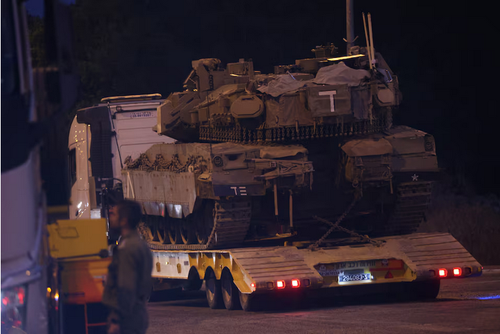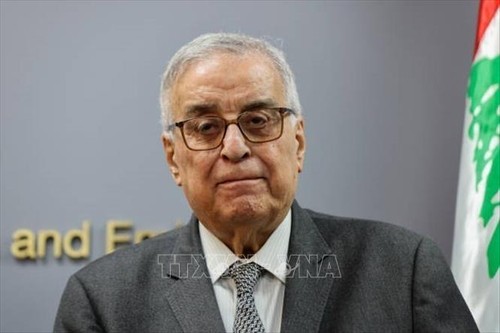 Israeli army transports tanks to the border as it launches ground offensive in southern Lebanon on October 1. (photo: Reuters) Israeli army transports tanks to the border as it launches ground offensive in southern Lebanon on October 1. (photo: Reuters) |
On Tuesday, the Israeli Defense Forces launched a ground offensive against Hezbollah in southern Lebanon, escalating long-standing hostilities.
New battlefield
A few days ago Israel’s air force carried out heavy airstrikes on multiple locations in Lebanon, including the capital Beirut, destroying Hezbollah facilities and equipment and killing senior leaders, including top leader Hassan Nasrallah on September 27th. The Israeli army said it was necessary to eliminate threats near the Israel-Lebanon border and that the Israeli army will do everything possible to avoid an incident like the Hamas attack on October 7 last year.
Israeli military spokesman Daniel Hagari said: “We will not let October 7 happen again on any one of our borders. We will do everything necessary so that Israeli families can return home to live in safety and security.”
Although the Israeli army said its ground offensive on the border is limited to certain targets, observers say the situation could quickly get out of control.
Paul Moorcraft, Director of the Center for Foreign Policy Analysis in London, said the Israeli army has learned lessons from previous ground offensives in Lebanon, but Hezbollah will be more difficult to deal with than the Hamas movement in the Gaza Strip because it has stronger military capabilities and a tighter network.
Moorcraft said that if Iran, Hezbollah's most important ally, gives Hezbollah stronger support, the situation will be much worse and won’t be limited to southern Lebanon. "It could trigger a major conflict in the Middle East. It could spark more wars elsewhere, like the conflict between Saudi Arabia and the Houthis in Yemen. or Syria sending troops back to the Golan Heights. That could be a very big war."
Moorcraft’s warning became more urgent after Iran launched 200 modern hypersonic ballistic missiles at Israel on Tuesday night in retaliation for the killing of Hamas and Hezbollah leaders. This represented a notable escalation from a similar attack in April earlier this year, compelling Israel to respond with a forceful retaliation.
 Lebanon's Foreign Minister Abdallah Bouhabib (photo: Getty Images/VNA) Lebanon's Foreign Minister Abdallah Bouhabib (photo: Getty Images/VNA) |
Growing risk of a full-blown crisis in Lebanon
Beyond the looming threat of a widespread war in the Middle East, Lebanon is on the verge of a full-blown crisis. As of October 1, some 1,000 Lebanese civilians had been killed in Israeli strikes targeting Hezbollah facilities. The bloodiest day in Lebanon in three decades occurred on September 23, when 492 people were killed and more than 1,600 injured in Israeli airstrikes. Since the outbreak of fighting in Gaza last October, more than 1,600 Lebanese civilians, including 100 children, have lost their lives in intensified clashes between Hezbollah and Israel.
Nasser Yassin, the Minister coordinating the Lebanese Government’s crisis response, says more than a million Lebanese have fled their homes in the last two weeks. Recent events, particularly the devastating Beirut port explosion in 2021, have exacerbated a political, economic, and social crisis that has been ongoing for decades.
Addressing the UN General Assembly last week, Lebanese Foreign Minister Abdallah Bouhabib warned of Lebanon's deteriorating state. “Lebanon is facing a crisis that threatens its very survival. The future of the Lebanese people and the country's prosperity are at risk. Urgent international intervention is needed before the situation spirals out of control, potentially triggering a domino effect that makes the crisis uncontainable.”
In a report last week, the UN Human Right Council and the United Nations Office for the Coordination of Humanitarian Affairs said Lebanon's medical and humanitarian infrastructure is becoming overwhelmed by the escalating violence.
The UN peacekeeping mission in Lebanon, operating since 2006 under Resolution 1701, has been largely paralyzed. Jean-Pierre Lacroix, UN Under-Secretary-General for Peacekeeping Operations, said the UN Interim Force in Lebanon’s mission to protect civilians is being threatened by the fighting in southern Lebanon.